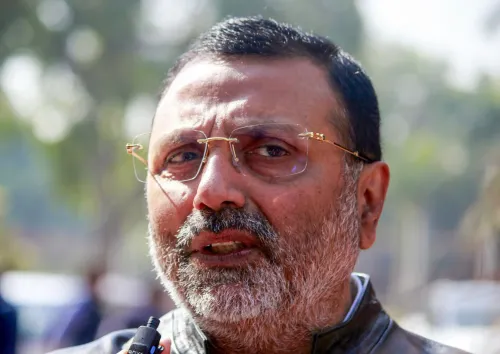Are Illegal Gambling Platforms Endangering Youth in India?

Synopsis
Key Takeaways
- Illegal online gambling poses risks to minors.
- Over 5.4 billion visits to illegal platforms in a year.
- Many platforms bypass essential safety checks.
- $100 billion lost annually to illegal betting.
- Urgent action needed to protect vulnerable groups.
Mumbai, June 1 (NationPress) A recent report has raised alarming issues regarding the escalating danger posed by illegal online gambling sites in India, particularly for vulnerable demographics such as minors and young adults.
The analysis conducted by public policy think tank CUTS International warns that these sites are not only luring impressionable individuals with addictive and risky games but are also circumventing essential safety measures, including age checks and identity verification.
The extent of this issue is staggering. From April 2024 to March 2025, over 5.4 billion visits were recorded on the top 15 illegal gambling platforms, which span across 40 mirror websites.
Platforms like Parimatch, 1xBet, Stake, Fairplay, and BateryBet rank among the most frequented.
In fact, Parimatch's web traffic in March 2025 exceeded that of well-known sites such as Google India, Amazon, Wikipedia, and Hotstar, underscoring the alarming reach of these operations.
CUTS International estimates that users are funneling nearly $100 billion annually into these illicit gambling platforms.
Many of these sites are operated offshore and exploit loopholes in India’s financial systems and advertising networks to function unimpeded, representing a significant threat to consumer safety and national security.
Pradeep Mehta, Founder and Secretary General of CUTS International, stated that illegal gambling operators are capitalizing on India's digital framework while evading accountability.
“This represents a significant national security risk and exposes Indian consumers to serious harm,” Mehta remarked during the report’s unveiling.
One of the most concerning revelations is how easily minors can access these gambling sites.
These platforms often sidestep even the most fundamental checks such as KYC (Know Your Customer) or age verification.
Some even provide cash-on-delivery payment methods, enabling teenagers with no access to digital wallets or cards to gamble repeatedly without oversight.
The incorporation of high-stakes, psychologically addictive game designs increases their danger for young, thrill-seeking individuals.
The report also elucidates how these platforms garner such significant traffic. Approximately 66 percent of users access them directly, often via saved links, private messages, or bookmarks, creating a misleading sense of trust and credibility.
Extensive media campaigns, celebrity endorsements, billboards, and SEO-enhanced visibility further amplify their reach.









